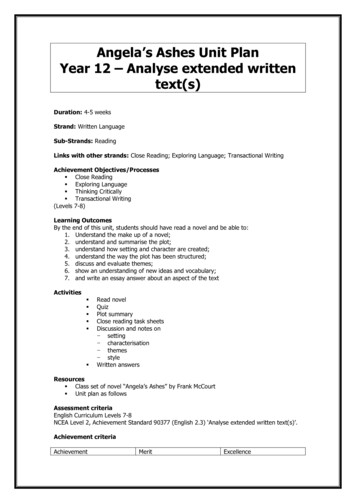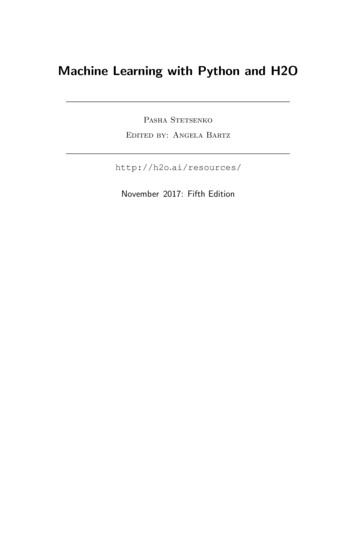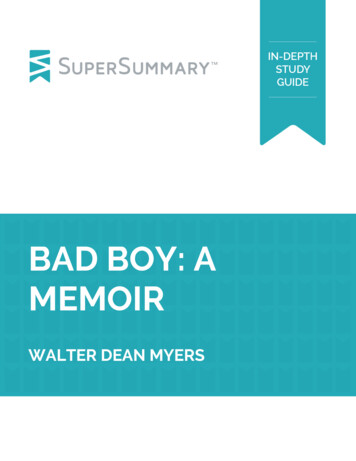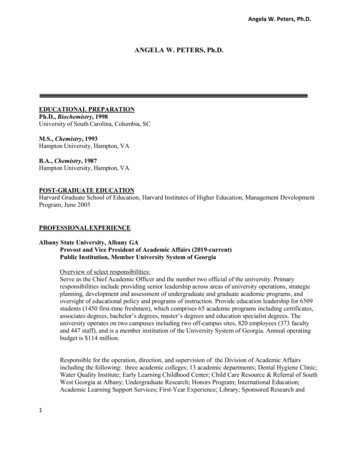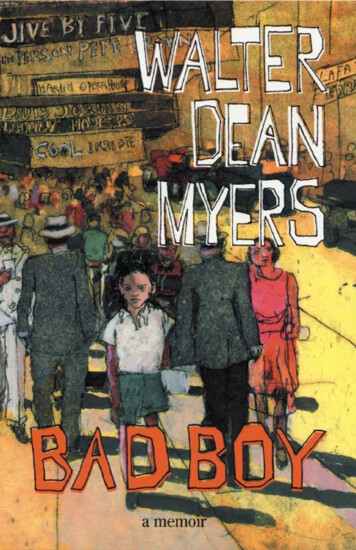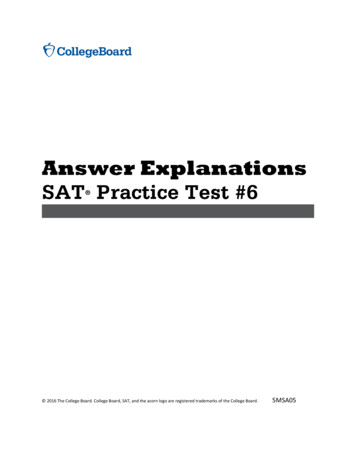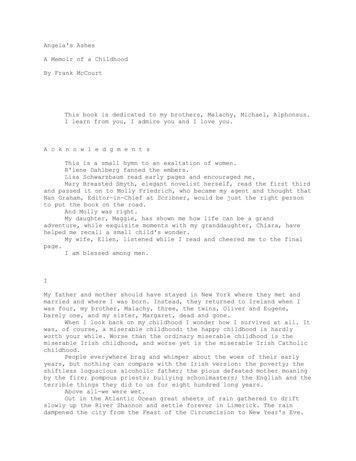
Transcription
Angela's AshesA Memoir of a ChildhoodBy Frank McCourtThis book is dedicated to my brothers, Malachy, Michael, Alphonsus.I learn from you, I admire you and I love you.A c k n o w l e d g m e n t sThis is a small hymn to an exaltation of women.R'lene Dahlberg fanned the embers.Lisa Schwarzbaum read early pages and encouraged me.Mary Breasted Smyth, elegant novelist herself, read the first thirdand passed it on to Molly Friedrich, who became my agent and thought thatNan Graham, Editor-in-Chief at Scribner, would be just the right personto put the book on the road.And Molly was right.My daughter, Maggie, has shown me how life can be a grandadventure, while exquisite moments with my granddaughter, Chiara, havehelped me recall a small child's wonder.My wife, Ellen, listened while I read and cheered me to the finalpage.I am blessed among men.IMy father and mother should have stayed in New York where they met andmarried and where I was born. Instead, they returned to Ireland when Iwas four, my brother, Malachy, three, the twins, Oliver and Eugene,barely one, and my sister, Margaret, dead and gone.When I look back on my childhood I wonder how I survived at all. Itwas, of course, a miserable childhood: the happy childhood is hardlyworth your while. Worse than the ordinary miserable childhood is themiserable Irish childhood, and worse yet is the miserable Irish Catholicchildhood.People everywhere brag and whimper about the woes of their earlyyears, but nothing can compare with the Irish version: the poverty; theshiftless loquacious alcoholic father; the pious defeated mother moaningby the fire; pompous priests; bullying schoolmasters; the English and theterrible things they did to us for eight hundred long years.Above all-we were wet.Out in the Atlantic Ocean great sheets of rain gathered to driftslowly up the River Shannon and settle forever in Limerick. The raindampened the city from the Feast of the Circumcision to New Year's Eve.
It created a cacophony of hacking coughs, bronchial rattles, asthmaticwheezes, consumptive croaks. It turned noses into fountains, lungs intobacterial sponges. It provoked cures galore; to ease the catarrh youboiled onions in milk blackened with pepper; for the congested passagesyou made a paste of boiled flour and nettles, wrapped it in a rag, andslapped it, sizzling, on the chest.From October to April the walls of Limerick glistened with thedamp. Clothes never dried: tweed and woolen coats housed living things,sometimes sprouted mysterious vegetations. In pubs, steam rose from dampbodies and garments to be inhaled with cigarette and pipe smoke lacedwith the stale fumes of spilled stout and whiskey and tinged with theodor of piss wafting in from the outdoor jakes where many a man puked uphis week's wages.The rain drove us into the church-our refuge, our strength, ouronly dry place. At Mass, Benediction, novenas, we huddled in great dampclumps, dozing through priest drone, while steam rose again from ourclothes to mingle with the sweetness of incense, flowers and candles.Limerick gained a reputation for piety, but we knew it was only therain.My father, Malachy McCourt, was born on a farm in Toome, CountyAntrim. Like his father before, he grew up wild, in trouble with theEnglish, or the Irish, or both. He fought with the Old IRA and for somedesperate act he wound up a fugitive with a price on his head.When I was a child I would look at my father, the thinning hair,the collapsing teeth, and wonder why anyone would give money for a headlike that. When I was thirteen my father's mother told me a secret: as awee lad your poor father was dropped on his head. It was an accident, hewas never the same after, and you must remember that people dropped ontheir heads can be a bit peculiar.Because of the price on the head he had been dropped on, he had tobe spirited out of Ireland via cargo ship from Galway. In New York, withProhibition in full swing, he thought he had died and gone to hell forhis sins. Then he discovered speakeasies and he rejoiced.After wandering and drinking in America and England he yearned forpeace in his declining years. He returned to Belfast, which erupted allaround him. He said, A pox on all their houses, and chatted with theladies of Andersontown. They tempted him with delicacies but he wavedthem away and drank his tea. He no longer smoked or touched alcohol, sowhat was the use? It was time to go and he died in the Royal VictoriaHospital.My mother, the former Angela Sheehan, grew up in a Limerick slumwith her mother, two brothers, Thomas and Patrick, and a sister, Agnes.She never saw her father, who had run off to Australia weeks before herbirth.After a night of drinking porter in the pubs of Limerick hestaggers down the lane singing his favorite song, Who threw the overallsin Mrs. Murphy's chowder?Nobody spoke so he said it all the louder It's a dirty Irish trickand I can lick the Mick Who threw the overalls in Murphy's chowder.He's in great form altogether and he thinks he'll play a while withlittle Patrick, one year old. Lovely little fella. Loves his daddy.Laughs when Daddy throws him up in the air. Upsy daisy, little Paddy,upsy daisy, up in the air in the dark, so dark, oh, Jasus, you miss thechild on the way down and poor little Patrick lands on his head, gurgles
a bit, whimpers, goes quiet. Grandma heaves herself from the bed, heavywith the child in her belly, my mother. She's barely able to lift littlePatrick from the floor. She moans a long moan over the child and turns onGrandpa. Get out of it. Out. If you stay here a minute longer I'll takethe hatchet to you, you drunken lunatic. By Jesus, I'll swing at the endof a rope for you. Get out.Grandpa stands his ground like a man. I have a right, he says, tostay in me own house.She runs at him and he melts before this whirling dervish with adamaged child in her arms and a healthy one stirring inside. He stumblesfrom the house, up the lane, and doesn't stop till he reaches Melbournein Australia.Little Pat, my uncle, was never the same after. He grew up soft inthe head with a left leg that went one way, his body the other. He neverlearned to read or write but God blessed him in another way. When hestarted to sell newspapers at the age of eight he could count moneybetter than the Chancellor of the Exchequer himself. No one knew why hewas called Ab Sheehan, The Abbot, but all Limerick loved him.My mother's troubles began the night she was born. There is mygrandmother in the bed heaving and gasping with the labor pains, prayingto St. Gerard Majella, patron saint of expectant mothers. There is NurseO'Halloran, the midwife, all dressed up in her finery. It's New Year'sEve and Mrs. O'Halloran is anxious for this child to be born so that shecan rush off to the parties and celebrations. She tells my grandmother:Will you push, will you, push. Jesus, Mary and holy St. Joseph, if youdon't hurry with this child it won't be born till the New Year and whatgood is that to me with me new dress? Never mind St. Gerard Majella. Whatcan a man do for a woman at a time like this even if he is a saint? St.Gerard Majella my arse.My grandmother switches her prayers to St. Ann, patron saint ofdifficult labor. But the child won't come. Nurse O'Halloran tells mygrandmother, Pray to St. Jude, patron saint of desperate cases.St. Jude, patron of desperate cases, help me. I'm desperate. Shegrunts and pushes and the infant's head appears, only the head, mymother, and it's the stroke of midnight, the New Year. Limerick Cityerupts with whistles, horns, sirens, brass bands, people calling andsinging, Happy New Year. Should auld acquaintance be forgot, and churchbells all over ring out the Angelus and Nurse O'Halloran weeps for thewaste of a dress, that child still in there and me in me finery. Will youcome out, child, will you? Grandma gives a great push and the child is inthe world, a lovely girl with black curly hair and sad blue eyes.Ah, Lord above, says Nurse O'Halloran, this child is a timestraddler, born with her head in the New Year and her arse in the Old orwas it her head in the Old Year and her arse in the New. You'll have towrite to the Pope, missus, to find out what year this child was born inand I'll save this dress for next year.And the child was named Angela for the Angelus which rang themidnight hour, the New Year, the minute of her coming and because she wasa little angel anyway.Love her as in childhoodThough feeble, old and grey.For you'll never miss a mother's loveTill she's buried beneath the clay.
At the St. Vincent de Paul School, Angela learned to read, write,and calculate and by her ninth year her schooling was done. She tried herhand at being a charwoman, a skivvy, a maid with a little white hatopening doors, but she could not manage the little curtsy that isrequired and her mother said, You don't have the knack of it. You're pureuseless. Why don't you go to America where there's room for all sorts ofuselessness? I'll give you the fare.She arrived in New York just in time for the first Thanksgiving Dayof the Great Depression. She met Malachy at a party given by DanMacAdorey and his wife, Minnie, on Classon Avenue in Brooklyn. Malachyliked Angela and she liked him. He had a hangdog look, which came fromthe three months he had just spent in jail for hijacking a truck. He andhis friend John McErlaine believed what they were told in the speakeasy,that the truck was packed to the roof with cases of canned pork andbeans. Neither knew how to drive and when the police saw the truck lurchand jerk along Myrtle Avenue they pulled it over. The police searched thetruck and wondered why anyone would hijack a truck containing, not porkand beans, but cases of buttons.With Angela drawn to the hangdog look and Malachy lonely afterthree months in jail, there was bound to be a knee-trembler.A knee-trembler is the act itself done up against a wall, man andwoman up on their toes, straining so hard their knees tremble with theexcitement that's in it.That knee-trembler put Angela in an interesting condition and, ofcourse, there was talk. Angela had cousins, the MacNamara sisters, Deliaand Philomena, married, respectively, to Jimmy Fortune of County Mayo,and Tommy Flynn, of Brooklyn itself.Delia and Philomena were large women, great-breasted and fierce.When they sailed along the sidewalks of Brooklyn lesser creatures steppedaside, respect was shown. The sisters knew what was right and they knewwhat was wrong and any doubts could be resolved by the One, Holy, Roman,Catholic and Apostolic Church. They knew that Angela, unmarried, had noright to be in an interesting condition and they would take steps.Steps they took. With Jimmy and Tommy in tow they marched to thespeakeasy on Atlantic Avenue where Malachy could be found on Friday,payday when he had a job. The man in the speak, Joey Cacciamani, did notwant to admit the sisters but Philomena told him that if he wanted tokeep the nose on his face and that door on its hinges he'd better open upfor they were there on God's business. Joey said, Awright, awright, youIrish. Jeezoz! Trouble, trouble.Malachy, at the far end of the bar, turned pale, gave the greatbreasted ones a sickly smile, offered them a drink. They resisted thesmile and spurned the offer. Delia said, We don't know what class of atribe you come from in the North of Ireland.Philomena said, There is a suspicion you might have Presbyteriansin your family, which would explain what you did to our cousin.Jimmy said, Ah, now, ah, now. 'Tisn't his fault if there'sPresbyterians in his family.Delia said, You shuddup.Tommy had to join in. What you did to that poor unfortunate girl isa disgrace to the Irish race and you should be ashamed of yourself.Och, I am, said Malachy. I am.
Nobody asked you to talk, said Philomena. You done enough damagewith your blather, so shut your yap.And while your yap is shut, said Delia, we're here to see you dothe right thing by our poor cousin, Angela Sheehan.Malachy said, Och, indeed, indeed. The right thing is the rightthing and I'd be glad to buy you all a drink while we have this littletalk.Take the drink, said Tommy, and shove it up your ass.Philomena said, Our little cousin no sooner gets off the boat thanyou are at her. We have morals in Limerick, you know, morals. We're notlike jackrabbits from Antrim, a place crawling with Presbyterians.Jimmy said, He don't look like a Presbyterian.You shuddup, said Delia.Another thing we noticed, said Philomena. You have a very oddmanner.Malachy smiled. I do?You do, says Delia. I think 'tis one of the first things we noticedabout you, that odd manner, and it gives us a very uneasy feeling.'Tis that sneaky little Presbyterian smile, said Philomena.Och, said Malachy, it's just the trouble I have with my teeth.Teeth or no teeth, odd manner or no odd manner, you're gonna marrythat girl, said Tommy. Up the middle aisle you're going.Och, said Malachy, I wasn't planning to get married, you know.There's no work and I wouldn't be able to support.Married is what you're going to be, said Delia.Up the middle aisle, said Jimmy.You shuddup, said Delia.Malachy watched them leave. I'm in a desperate pickle, he told JoeyCacciamani.Bet your ass, said Joey. I see them babes comin' at me I jump innaHudson River.Malachy considered the pickle he was in. He had a few dollars inhis pocket from the last job and he had an uncle in San Francisco or oneof the other California Sans. Wouldn't he be better off in California,far from the great breasted MacNamara sisters and their grim husbands? Hewould, indeed, and he'd have a drop of the Irish to celebrate hisdecision and departure. Joey poured and the drink nearly took the liningoff Malachy's gullet. Irish, indeed! He told Joey it was a Prohibitionconcoction from the devil's own still. Joey shrugged. I don't knownothing. I only pour. Still, it was better than nothing and Malachy wouldhave another and one for yourself, Joey, and ask them two decent Italianswhat they'd lik
Angela's Ashes A Memoir of a Childhood By Frank McCourt This book is dedicated to my brothers, Malachy, Michael, Alphonsus. I learn from you, I admire you and I love you. A c k n o w l e d g m e n t s This is a small hymn to an exaltation of women. R'lene Dahlberg fanned the embers. Lisa Schwarzbaum read early pages and encouraged me.File Size: 1MBPage Count: 235
